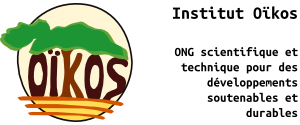Conférence atelier au Bénin sur la sécurité alimentaire
Comment augmenter les productions alimentaires tout en luttant contre le changement climatique ?
The conference which was to take place Cotonou in June, 20 to 24, is postponed to allow a better preparation. Please continue to submit contributions relevant to the objectives of this conference
***
La conférence prévue du 20 au 24 Juin à Cotonou est reportée pour permettre une meilleure préparation. Merci de continuer à nous soumettre des contributions conformément aux objectifs de cette conférence

Due to both insufficient scientific and technical input relevant to the objectives of the conference as well as to insufficient funding, the co-chair of the conference have decided to postpone this event. This information will be put on the web (www. oikos-foodsecurity.org). More information for the scientific and technical committee will follow.
Dear colleagues,
Our objective is to organize a useful conference for Sub- Saharan Africa: to provide useful inputs to alleviate the food crisis, today and in the future, to mitigate and adapt to climate change and also for international negotiations, including under the Convention on Climate Change. Unfortunately, up to now, we got to little scientific and technical proposals, relevant to the objective of the conference. This would have been sufficient to postpone it. But we were also not able to rise enough funding. Let us below consider these two aspects.
Scientific and technical participation:
1. Improvement of land use efficiency (W.G. 1 & 2) and conversion efficiencies of agricultural products (W.G. 4 & 5) and use this kind of actions (having a positive effect for climate change mitigation) to get some earmarked funding for farmers, (for instance under the Climate Change Convention).
The objective is to produce more food without too much land use change (deforestation and grassland conversion), and without soil degradation. Basically the approach for Sub-Saharan Africa and some least developed countries is to be very different from other countries with already strong agricultural policies and good inputs. In Sub-Saharan Africa we actually do need to increase mineral and organic inputs. But to get money for that we must first be able to quantify the positive effect, not only on the increase of food production, on the amount of avoided greenhouse gas emissions. We need therefore to determine how to implement this, and find ways to make this recognized as a positive contribution to climate change mitigation. We do need also to find ways to make such actions beneficial for African farmers and countries. We do need also to make understood why this is an attractive option for Africa. More experts (scientists, teachers and technicians), in particular in Africa, are therefore to be able to demonstrate that, in order to convey adequate messages to decision makers and negotiators, and also to experts from other sectors, more familiar for instance with fossil energy issues than with agriculture.
Up to now we definitely underestimated this task. We need to recognize that. More training and more experimental and demonstrative operations (at field, farm, village, and regional level) prior to organizing such a conference is apparently necessary to get valuable contributions. But our group does not have the capacity to do that. We will probably have to rely on existing organizations. We shall discuss such issues for instances next week, in Adis Abeba, with the Head of the African Climate Policy Center, a division of the Food Security and Sustainable Development Division of the United Economic Commission for Africa.
Your comments and suggestions on this issue are welcome.
2. The network of experimental gardens (W.G. 3): For this task we got already interesting proposals from Brazil, France. Others for instance from India are to come. The issue at this stage is to see how we can exchange “know how” and plant material for experimental gardens, as well as for home gardens. This task already started and needs to be further supported by more concrete involvements of farmers with scientific interest, or by scientists really interested in finding applicable solutions for farmers and to cope with food insecurity under a changing climate. It is a long term objective and there is therefore no reason to do this in a hurry. Your comments, contributions on this issue are also welcome
Funding
Without enough funding we can expect to mobilize neither African nor International experts. Finding funds was already difficult due to the financial crisis. We got many negative, or no, response from institutional donors. Moreover, with the recent changes in particular in the Mediterranean area, the situation became even more complicated. And as we are not experts in fund raising we do need to find another solution. Suggestions and comments on this issue are welcome.
Do feel free to make any suggestions and comments and please do indicate also whether or not, and how, you may want to continue to support this initiative.
Yours sincerely
The co-chair of the conference, Arthur Riedacker and Firmin Adjahossou
